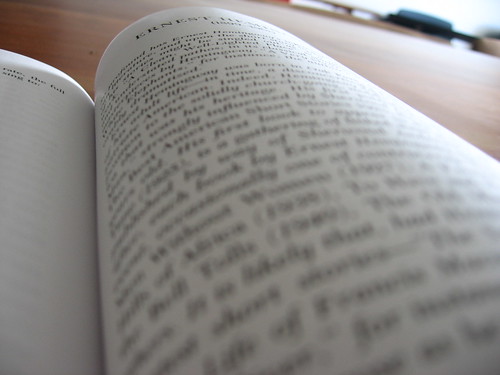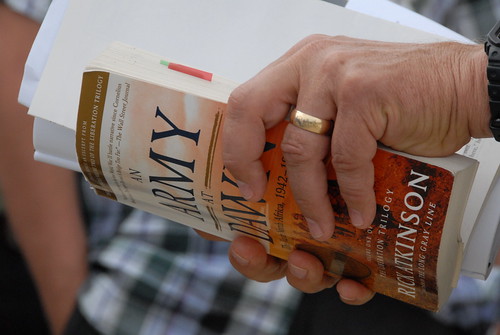How I Blog
/
I have been blogging since the spring of 2003 or 2004 (I can't remember exactly when I started), but I really began serious writing about it for only a couple of those years, running and writing for a couple of different and diverse blogs out there. Writing online is a good thing, I'm finding, and if it is something that is incredibly easy to get started. Because of that, there are a lot of bad sites out there, from people who started doing pretty much what I started with, and I wanted to share what I have found that works.
Come up with a plan.
The first major step towards creating something that will be of public interest and a resource is knowing exactly what you are intending on writing about. This blog isn't really devoted to anything in particular: I cover a wide range of popular culture, from books to films, but I also touch on history of several areas (Military, Space, etc), or political commentary. It's decidedly not like my other blog, Carry You Away, which is devoted to various types of music, and while I'm not as active with it, I've maintained a very different sort of focus for it. I read a lot of book and music blogs over the course of a day, and the thing that some just can't step away from is what they're focusing on: books? Movies? Music?
But beyond the topic, the big goal is to fully understand what (or who) you are writing for. Coming up with a small strategic plan, which helps to lay out where you want the blog to go in a week, in a month, 6 months and a year, will help steer the focus of the blog, and thus approach your material in a prepared fashion, rather than off the cuff. This is especially important for sites that depend upon revenue to keep running, through ads and so forth. Growing a blog to gain a significant audience is especially good for reviewers, because A) People will respect and look to you for opinions while B) you can do a good service towards whatever community that you are writing for. Moreover, people tend to cluster based on their interests, and communities exist for science fiction, military history and music, and being able to write for these groups helps everyone by putting a good, polished opinion out there with sound reasoning.
Write well, don't write good
Grammar and spelling is important to writers. Once you understand what you are working towards, you must be able to articulate your opinions in a clear method in which you can address the topic at hand. In the case of a reviewer, you are talking about why a product is a good one, which comes down to two parts of the equation: what are the parts that make it worth spending money on, and what is not good? In the midst of that, you begin to speak towards elements of plot and style, characters and everything like that. When looking at literary theory and analysis, you will want to have a good background in what you're writing about: know your subject, read background material and come up with an argument that makes sense. In all cases, concrete evidence and sources are essential. In talking about a good book, I'm likely to do more than simply say that I liked the book: what specific instances make the book a good one, what element of history supports your argument. Gut feelings are good, but things to point to are even better.
Beyond writing well, it is also good to edit oneself. I have long since broken the habit of writing up a blog post in the actual window: entries and reviews are typed up in a different window, with a spell check, and with at least a read through to change things here and there. This extra effort goes a very, very long way. As someone at ReaderCon noted during a panel: “If you submit work to an editor, and they consistently find that they don’t need to change much, they’re likely to go to you again.”
Don't be a fanboy. (Or girl)
This falls more towards the annoying sites that I’ve come across, but whether this is towards a specific subject, author, publisher or reviews in general, don't be completely positive with everything, and try and write about more than one or two subjects: diversify. This comes in two forms: subject, and specific instances.
The blogs and sites that I like the most have a wide variety of material on them, and they can bring some of those things together over time in their arguments. I've largely passed on sites that shill a single type of book or film, simply because there's only so many times that I can read about X, Y and Z. While I'm a huge Star Wars fan, there's a lot of things wrong with the series, and a lot to nitpick. Specializing is one thing, overdoing it is another.
The same goes for any author or publisher. There are several authors that I've read extensively on, and reviewed, and while their material is good, it's not perfect, and it's better to point out these things, to be a bit critical, to avoid becoming someone who simply gives everything an A and moves. It destroys credibility, but it also weakens the review if there are things that the reviewer misses.
(This same sort of over-grading applies to graduate school and education in general, and it's something that is very, very annoying.)
Write a lot. Then write some more.
Now that you have your direction, you have your topics, and you're taking care to review things carefully, the final step is to keep plugging away with content. This is where I have issues with most reviewer blogs, because of the sheer volume of books that are reviewed by a single person. A variety of content is good, mixing reviews and analysis, because it demonstrates that there is a synthesis of what you are reading with commentary based on the same (or similar) subject. More content generally means more people coming in to see if you've written something new, and the big sites such as io9 and SF Signal upload a lot of content throughout the day.
When I blogged extensively in the music world, I saw a definite uptick of hits when I write every day for the site - the same is true for this page as well: more posts = more readers. If it's not practical to write every single day, regularity is key. I know that I check into Post Secret like clockwork on Monday morning after the page has been updated. People fall into habits, even with things like Google Reader and RSS feeds.
The point of all this isn’t to feel magnanimous about my meager efforts writing, but because it’s something that I’ve come up with over the past seven years through a lot of trial and error. I have only come to begin writing professionally in the past year or so, and in that time, I have met a lot of people who are in the same position that I am in – people with big aspirations. Hopefully, we will all reach that point someday. In the time being, writing is like any profession: it takes a lot of work, effort and persistence.





